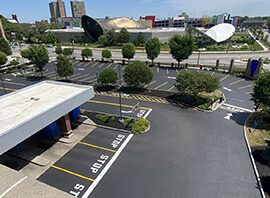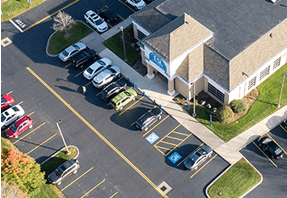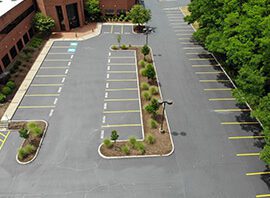Feb 11, 2025 | 1-800-Striper Central Atlanta
In early January, the Justice Department expanded its lawsuit against RealPage naming the six largest apartment owner-operators as defendants. The suit alleges collusive price fixing. It also may impact maintenance budgets for apartment operators. As litigation risks mount, operators may be compelled to defer regular maintenance. However, delaying maintenance items, particularly routine maintenance, can result in operating impacts—from diminished curb appeal to costly “catch-up” repairs in the future.
Types of Maintenance
Maintenance generally falls into two categories: necessary and routine. Necessary maintenance includes critical repairs, such as fixing broken plumbing and faulty HVAC systems. These are non-negotiable repairs immediately impacting tenant living conditions.
Routine maintenance are projects deemed not immediately urgent but are essential to maintain a property’s appearance and value. Examples include painting, pressure washing, and parking lot maintenance and striping. These activities may seem optional to property managers in the short term, but they play a crucial role in maintaining curb appeal and tenant satisfaction, retention and attraction. Longer term they also represent real costs for deferred maintenance catch-up.
The Financial Risks of Deferred Maintenance
When routine maintenance is delayed, small issues can escalate into major, costly repairs. For example, faded parking lot striping not only diminishes a property’s aesthetic but can also lead to safety concerns, especially when it comes to ADA markings and cross-walks. Similarly, neglecting pressure washing can allow grime and mildew to build up, potentially damaging building exteriors and walkways – requiring expensive restorations.
Moreover, deferred maintenance affects tenant retention. Properties with declining curb appeal risk losing tenants to competitors, leading to higher vacancy rates and lost revenue. Worse yet, neglecting regular upkeep can harm a property’s reputation and reviews, making it harder to attract new tenants.
Cost Saving with Proactive Maintenance
Investing in regular, proactive maintenance is not just good practice; it’s smart finance. By addressing small issues early, operators prevent them from becoming expensive problems. Proactive maintenance also boosts tenant satisfaction, which can lead to higher retention rates and a stronger reputation in the market. High-visibility areas, such as parking lots and building exteriors, should be top priorities.
Delaying regular maintenance might seem like a way to cut costs, but the medium-term risks far outweigh the short-term savings. From reduced curb appeal to escalating repair expenses, deferred maintenance jeopardizes both a property’s financial performance and tenant satisfaction. By investing in consistent upkeep, apartment operators can protect their assets, attract quality tenants, and maintain a competitive edge.

Had our parking lot paved and found ourselves needing lines. Their team was fantastic from start to finish. They took the time to give great advice and listened closely to our company’s needs.

They are very responsive and complete the work in a timely fashion. I have used them for 18 years and have never had any issue with their work. Very highly recommended.

They are very easy to work with and have a highest level of attention to detail. They are very knowledgeable and passionate about parking lot striping. Their quality of work is outstanding!
COPYRIGHT © 1999-2025 | ALL RIGHTS RESERVED STRIPER INDUSTRIES, INC. | Privacy Policy